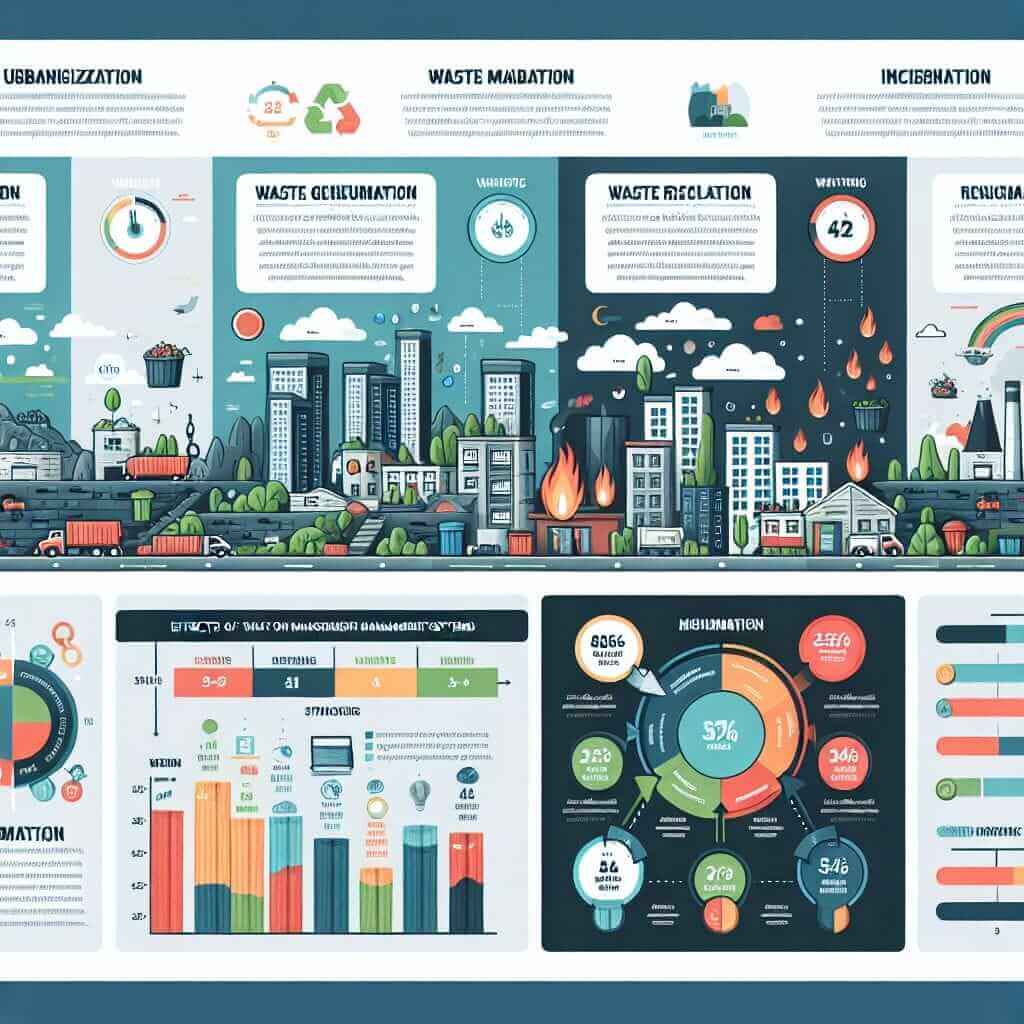The IELTS Reading section tests your ability to understand, interpret, and analyze texts ranging from descriptive to argumentative styles. One common theme in past IELTS exams has been the impact of urbanization on various systems and sectors, including waste management. This theme is prevalent due to its contemporary relevance and frequent appearance in global discussions. Given the focus on sustainable development and urban growth, it is likely that this topic will continue to appear in future exams.
Main Content
Reading Passage
Waste Management Challenges in Urban Areas
Urbanization significantly influences waste management systems, creating challenges and opportunities for city planners. Rapid urban development has led to an increased population density in urban areas, straining existing waste management infrastructures.
One major issue is the sheer volume of waste generated. Urban residents produce more waste per capita than their rural counterparts due to higher consumption levels and a greater use of packaged products. This surge in waste demands more efficient collection, transportation, and disposal methods.
Furthermore, urbanization introduces diverse types of waste, including electronic waste (e-waste) and construction debris. These require specialized handling and disposal techniques, adding complexity to waste management systems. Inadequate segregation of waste at the source further complicates recycling efforts and increases landfill dependency.
Another significant challenge is the environmental impact. Poorly managed waste in urban areas can lead to air and water pollution. Landfills, often located on the outskirts of cities, emit greenhouse gases like methane, contributing to climate change. Additionally, leachate from landfills can contaminate local water supplies, posing health risks to nearby communities.
In response to these challenges, cities worldwide are adopting innovative waste management practices. Recycling and composting programs are becoming more common, aiming to reduce the volume of waste sent to landfills. Some cities are investing in waste-to-energy technologies, converting waste into electricity and heat.
Moreover, smart waste management systems utilizing technology and data analytics are being implemented to optimize collection routes, monitor waste levels in real-time, and improve overall efficiency. Public education campaigns focusing on waste reduction, reuse, and recycling are also crucial in fostering sustainable waste management practices.
However, the success of these initiatives depends on several factors, including government policies, public cooperation, and financial investment. While some cities have made significant strides, others struggle with limited resources and a lack of infrastructure.
In conclusion, while urbanization presents substantial challenges to waste management systems, it also offers opportunities for innovation and improvement. Addressing these challenges requires a multifaceted approach, incorporating technological advancements, policy interventions, and community engagement.
Key Vocabulary
- Urbanization (noun) /ˌɜːbənaɪˈzeɪʃn/: The process of making an area more urban.
- Segregation (noun) /ˌseɡrɪˈɡeɪʃn/: The action or state of setting someone or something apart from others.
- Landfill (noun) /ˈlændfɪl/: A site for the disposal of waste materials by burial.
- Leachate (noun) /ˈliːtʃeɪt/: The liquid that drains or ‘leaches’ from a landfill.
- Greenhouse gases (noun): Gases that trap heat in the atmosphere, contributing to global warming.
- Composting (noun) /ˈkɒmpɒstɪŋ/: A process that turns organic waste into compost.
Practice Questions
Question Type: Matching Headings
Passage Sections:
A. Volume of Waste
B. Diverse Types of Waste
C. Environmental Impact
D. Innovative Solutions
E. Key Success Factors
Tasks:
- Rapid urban development has led to an increased population density in urban areas.
- Cities worldwide are adopting innovative waste management practices.
- Leachate from landfills can contaminate local water supplies.
- Electronic waste (e-waste) and construction debris require specialized handling.
- Public education campaigns are crucial in fostering sustainable practices.
Answers and Explanations
-
A. Volume of Waste
- The text discusses the increased volume of waste generated by urban dwellers due to higher consumption levels.
-
D. Innovative Solutions
- The text describes various innovative waste management practices being implemented in cities around the world.
-
C. Environmental Impact
- This section of the text explains how poorly managed waste can lead to air and water pollution.
-
B. Diverse Types of Waste
- The text mentions that urbanization introduces diverse types of waste, such as electronic waste and construction debris.
-
E. Key Success Factors
- The passage highlights the importance of public education campaigns in promoting sustainable waste management practices.
Common Mistakes
- Misinterpreting Keywords: Ensure you understand the exact meaning of key terms within the context of the passage.
- Skipping Context: Always consider the entire sentence or paragraph to grasp the main idea before matching headings.
Conclusion
Tips for High Scores in IELTS Reading:
- Practice Regularly: Regular practice with diverse topics helps improve comprehension.
- Expand Vocabulary: A broad vocabulary aids in understanding complex passages.
- Time Management: Allocate time wisely and avoid spending too long on tricky questions.
- Skimming and Scanning: Develop these techniques to quickly locate key information.

By preparing well and familiarizing yourself with a variety of topics, including the influence of urbanization on waste management systems, you can enhance your chances of achieving a high score in the IELTS Reading section.